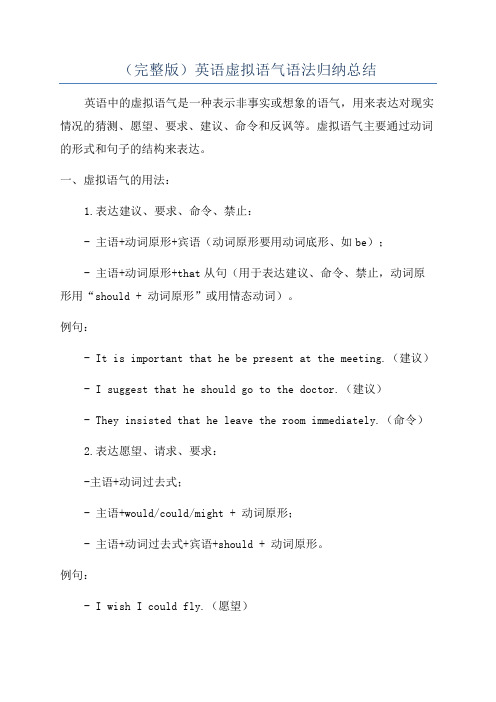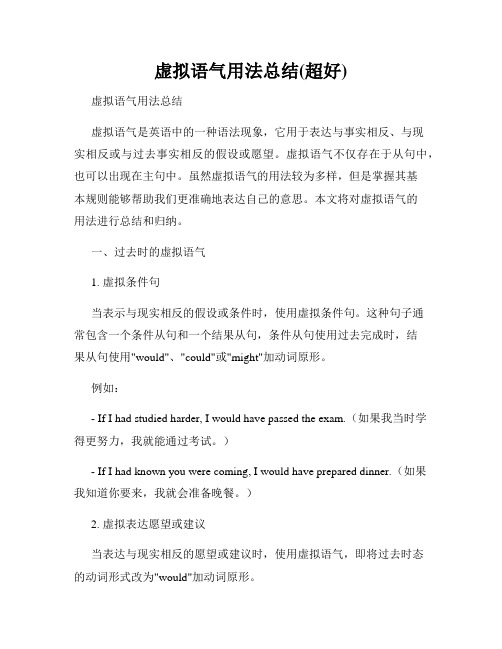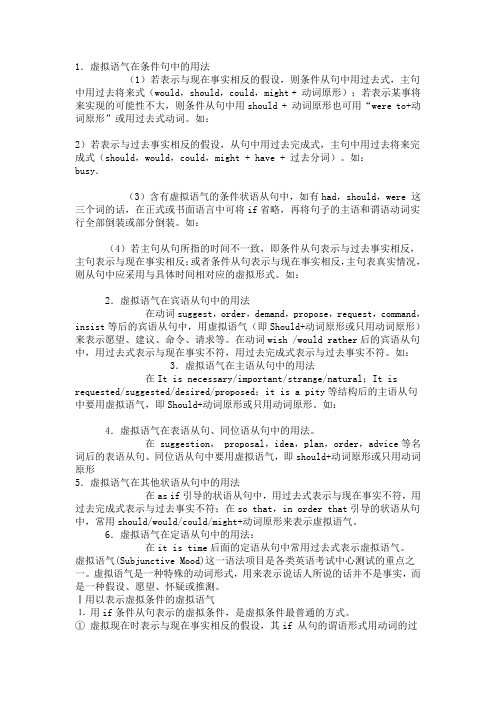关于虚拟语气的完整用法
(完整版)英语虚拟语气语法归纳总结

(完整版)英语虚拟语气语法归纳总结英语中的虚拟语气是一种表示非事实或想象的语气,用来表达对现实情况的猜测、愿望、要求、建议、命令和反讽等。
虚拟语气主要通过动词的形式和句子的结构来表达。
一、虚拟语气的用法:1.表达建议、要求、命令、禁止:- 主语+动词原形+宾语(动词原形要用动词底形、如be);- 主语+动词原形+that从句(用于表达建议、命令、禁止,动词原形用“should + 动词原形”或用情态动词)。
例句:- It is important that he be present at the meeting.(建议)- I suggest that he should go to the doctor.(建议)- They insisted that he leave the room immediately.(命令)2.表达愿望、请求、要求:-主语+动词过去式;- 主语+would/could/might + 动词原形;- 主语+动词过去式+宾语+should + 动词原形。
例句:- I wish I could fly.(愿望)- I would appreciate it if you could help me.(请求)3.表示虚拟条件:- If条件从句中的谓语动词用过去完成时,主句用would/should/might/could + have + 过去分词;- If条件从句中的谓语动词用过去时,主句用would/should/could + 动词原形。
例句:- If I had known his phone number, I would have called him.(虚拟条件)- If you had listened to me, we could have finished the project earlier.(虚拟条件)4.表达建议、要求、祝愿:- If only内部称述 + 主语 + 过去式。
虚拟语气的用法归纳

虚拟语气是一种特殊的动词形式,用来表达说话人的假设、愿望、猜测、建议等非现实的情况。
虚拟语气在英语中的使用非常广泛,包括情态动词、动词的过去式、过去完成时、be 型虚拟式等形式。
下面我将详细介绍虚拟语气的用法。
一、情态动词的虚拟语气1. 表示现在或将来的假设例如:If I had money, I would travel around the world.2. 表示过去的假设例如:If I had studied harder, I would have passed the exam.3. 表示与现在事实相反的愿望例如:I wish I were rich.4. 表示与过去事实相反的愿望例如:I wish I had studied harder.5. 表示与将来事实可能相反的愿望例如:I wish it would stop raining.二、动词的过去式的虚拟语气1. 表示现在或将来的假设例如:If I knew the answer, I would tell you.2. 表示过去的假设例如:If I had seen the movie, I would have recommended it to you.三、过去完成时的虚拟语气1. 表示过去的假设例如:If I had had more time, I would have finished the work.2. 表示与过去事实相反的愿望例如:I wish I had gone to the party last night.四、be型虚拟式1. 表示现在或将来的假设例如:If I were you, I would take the job.2. 表示与现在事实相反的愿望例如:I wish I were in Hawaii now.五、混合虚拟语气1. 表示过去的假设例如:If I had known that you were coming, I would have met you at the airport.2. 表示与过去事实相反的愿望例如:I wish I had studied harder and passed the exam.六、虚拟语气的特殊用法1. 在某些形容词后面使用虚拟语气例如:It is important that you be on time.2. 在某些名词后面使用虚拟语气例如:It is necessary that he study harder.3. 在某些介词后面使用虚拟语气例如:I am glad that you came.以上是虚拟语气的用法归纳,希望对大家有所帮助。
虚拟语气的用法总结

虚拟语气的用法总结以下是小编为大家总结的虚拟语气的用法,希望能帮助大家更好地掌握英语中虚拟语气的用法,提高英语水平。
一、虚拟语气的使用范围:虚拟语气用来表示说话人所说的话并不是事实,而是一种假设、愿望、怀疑或推测。
该语法主要用于if 条件状语从句中,也可用于主语从句、表语从句和宾语从句等。
二、虚拟语气的判断:1. if 条件状语从句中虚拟语气的判断。
if 条件状语从句有真实条件句和非真实条件句。
假设条件可以实现的句子为真实条件句,反之为非真实条件句,要用虚拟语气。
其形式分为以下三种:(1) 与过去事实相反的假设。
结构为:从句的谓语动词用“had + 过去分词”,主句用“should (would, could, might) + have + 过去分词”。
例如:If it had not rained so hard yesterday, we could have played tennis. 如果昨天没有下大雨,我们就能玩网球了。
(2) 与现在事实相反的假设。
结构为:从句的谓语动词用过去式,系动词用were,主句的谓语用“should (would, could, might) + 动词原形”。
例如:If I were in your position, I would marry her. 如果我是你,我就娶她为妻。
(3) 与将来事实相反的假设。
结构为:从句的谓语动词用“should (were to) + 动词原形”,主句用“should(would, could, might) + 动词原形”。
例如:If you should miss the chance, you would feel sorry for it. 如果你错过了这次机会,你会难过的。
2. 宾语从句中的虚拟语气用法。
(1) wish后接宾语从句中的虚拟语气:根据从句的意义来判断。
A: 表示与现在和将来事实相反的愿望,从句谓语动词用过去时态。
虚拟语气用法总结(超好)

虚拟语气用法总结(超好)虚拟语气用法总结虚拟语气是英语中的一种语法现象,它用于表达与事实相反、与现实相反或与过去事实相反的假设或愿望。
虚拟语气不仅存在于从句中,也可以出现在主句中。
虽然虚拟语气的用法较为多样,但是掌握其基本规则能够帮助我们更准确地表达自己的意思。
本文将对虚拟语气的用法进行总结和归纳。
一、过去时的虚拟语气1. 虚拟条件句当表示与现实相反的假设或条件时,使用虚拟条件句。
这种句子通常包含一个条件从句和一个结果从句,条件从句使用过去完成时,结果从句使用"would"、"could"或"might"加动词原形。
例如:- If I had studied harder, I would have passed the exam.(如果我当时学得更努力,我就能通过考试。
)- If I had known you were coming, I would have prepared dinner.(如果我知道你要来,我就会准备晚餐。
)2. 虚拟表达愿望或建议当表达与现实相反的愿望或建议时,使用虚拟语气,即将过去时态的动词形式改为"would"加动词原形。
例如:- I wish I were taller.(我希望我更高。
)- She suggested that he take a bus.(她建议他坐公交车。
)二、现在时的虚拟语气1. 虚拟条件句与过去时的虚拟条件句类似,现在时的虚拟条件句也包含一个条件从句和一个结果从句。
条件从句使用"were to"结构或"should"加动词原形,结果从句使用"would"、"could"或"might"加动词原形。
例如:- If I were to win the lottery, I would travel the world.(如果我中了彩票,我会周游世界。
高中英语虚拟语气的用法归纳

高中英语虚拟语气的用法归纳以下是高中英语虚拟语气的用法归纳:虚拟语气是一种特殊的动词形式,表示假设、愿望、建议、命令、猜测等非真实的情况。
一、基本用法1. 与现在事实相反条件从句:If + 主语 + 动词过去式(be 动词用 were)主句:主语 + would/should/could/might + 动词原形例句:If I were you, I would study harder. (如果我是你,我会更努力学习。
)Wouldn't life be boring if we had everything we wanted? (如果我们想要什么就有什么,生活岂不是很无聊?)2. 与过去事实相反条件从句:If + 主语 + had + 过去分词主句:主语 + would/should/could/might + have + 过去分词例句:If I had known your phone number, I would have called you. (如果我知道你的电话号码,我就给你打电话了。
)Couldn't you have done better if you had tried harder? (如果你再努力些,难道不能做得更好吗?)3. 与将来事实相反条件从句:① If + 主语 + 动词过去式② If + 主语 + were to + 动词原形③ If + 主语 + should + 动词原形主句:主语 + would/should/could/might + 动词原形例句:If it rained tomorrow, we would stay at home. (如果明天下雨,我们就待在家里。
)If she were to come here tomorrow, I would be very happy. (如果她明天来这儿,我会非常高兴。
)If he should fail in the exam, how disappointed his parents would be!(要是他考试不及格,他父母该多失望啊!)二、固定搭配1. wish 后的宾语从句与现在事实相反:从句用一般过去时与过去事实相反:从句用过去完成时与将来事实相反:从句用 would/could + 动词原形例句:I wish I were as tall as you. (我希望我和你一样高。
虚拟语气用法大全

1.虚拟语气在条件句中的用法(1)若表示与现在事实相反的假设,则条件从句中用过去式,主句中用过去将来式(would,should,could,might + 动词原形);若表示某事将来实现的可能性不大,则条件从句中用should + 动词原形也可用“were to+动词原形”或用过去式动词。
如:2)若表示与过去事实相反的假设,从句中用过去完成式,主句中用过去将来完成式(should,would,could,might + have + 过去分词)。
如:busy.(3)含有虚拟语气的条件状语从句中,如有had,should,were 这三个词的话,在正式或书面语言中可将if省略,再将句子的主语和谓语动词实行全部倒装或部分倒装。
如:(4)若主句从句所指的时间不一致,即条件从句表示与过去事实相反,主句表示与现在事实相反;或者条件从句表示与现在事实相反,主句表真实情况,则从句中应采用与具体时间相对应的虚拟形式。
如:2.虚拟语气在宾语从句中的用法在动词suggest,order,demand,propose,request,command,insist等后的宾语从句中,用虚拟语气(即Should+动词原形或只用动词原形)来表示愿望、建议、命令、请求等。
在动词wish /would rather后的宾语从句中,用过去式表示与现在事实不符,用过去完成式表示与过去事实不符。
如:3.虚拟语气在主语从句中的用法在It is necessary/important/strange/natural;It is requested/suggested/desired/proposed;it is a pity等结构后的主语从句中要用虚拟语气,即Should+动词原形或只用动词原形。
如:4.虚拟语气在表语从句、同位语从句中的用法。
在 suggestion, proposal,idea,plan,order,advice等名词后的表语从句、同位语从句中要用虚拟语气,即should+动词原形或只用动词原形5.虚拟语气在其他状语从句中的用法在as if引导的状语从句中,用过去式表示与现在事实不符,用过去完成式表示与过去事实不符;在so that,in order that引导的状语从句中,常用should/would/could/might+动词原形来表示虚拟语气。
虚拟语气的用法总结
虚拟语气是一种在语法上表示非事实或假设情况的语气。
它常用于表达愿望、建议、要求、命令、假设条件和虚拟情况等。
以下是虚拟语气的用法总结:1. 表达愿望:- 与过去事实相反的愿望:希望+过去式例如:I wish I were there.(我希望我在那里。
)- 对未来的愿望:希望+动词原形例如:I hope it stops raining.(我希望它停止下雨。
)2. 表达建议、要求和命令:- 表达建议:(should) + 动词原形例如:They suggested (that) he should take a break.(他们建议他休息一下。
)- 表达要求:(would) + 动词原形例如:He asked that she would close the door.(他要求她关上门。
)- 表达命令:(should) + 动词原形例如:It is important that you should arrive on time.(你准时到达很重要。
)3. 表达假设条件:- 表示与现在或将来事实相反的假设条件:if + 过去式,would + 动词原形例如:If I were rich, I would travel around the world.(如果我富有,我会周游世界。
)- 表示与过去事实相反的假设条件:if + had + 过去分词,would + have + 过去分词例如:If he had studied harder, he would have passed the exam.(如果他学习更努力,他就能通过考试。
)4. 表达推测和假设:- 推测现在的事实:(should) + 动词原形例如:He is late. He should be stuck in traffic.(他迟到了。
他可能被堵在交通上了。
)- 对过去的推测:(should) + have + 过去分词例如:She has disappeared. She should have left early.(她已经消失了。
虚拟语气的用法总结
虚拟语气的用法总结虚拟语气是一种语法现象,常常用于表达非真实情况、假设情况、愿望意愿等。
在英语中,虚拟语气有两种形式:过去虚拟语气和现在虚拟语气。
下面是对虚拟语气的用法进行总结。
一、过去虚拟语气的用法:1. 表达不可能实现的愿望、欲望或建议:If only + 主语 + 过去完成时(had + 过去分词)例句:If only I had studied harder, I would have passed the exam.(要是我当初努力学习的话,我就能通过考试了。
)2. 表示对过去发生的事情的假设:If + 主语 + had + 过去分词, 主语 + would/could/might + 动词原形例句:If I had taken the bus, I would have arrived on time.(要是我坐公共汽车的话,我本能准时到达。
)3. 表示对与现在事实相反的情况的假设:If + 主语 + 过去式, 主语 + would/could/might + 动词原形例句:If I were you, I would apologize to her.(要是我是你的话,我会向她道歉。
)4. 表达对不可能实现的条件:If only + 过去式例句:If only I had a million dollars.(要是我有一百万美元该多好。
)二、现在虚拟语气的用法:1. 表达建议、命令等正式用法:表达建议:(should +动词原形/动词原形)例句:It's important (that) you should take some rest.(你应该休息一下,这很重要。
)表达命令:(应用“命令式”的虚拟形式)例句:It's vital (that) he be here on time.(他必须准时到达,这很重要。
)2. 表达愿望、要求、建议等陈述式的用法:It's time/It's high time + 过去式例句:It's time you went to bed.(你该去睡觉了,时间到了。
最全虚拟语气用法总结-202X年学习资料
千里之行,始于足下。
最全虚拟语气用法总结-202X年学习资料
虚拟语气是表示假设、愿望、建议、命令等非事实的情况的一种语气形式。
下面是对虚拟语气用法的总结:
1.表示假设:
- 表示与现在事实相反的假设:
- 与过去事实相反:If + 过去完成时,主句使用 would/could/might + have + 过去分词。
- 与现在事实相反:If + 过去时,主句使用 would/could/might + 动
词原形。
- 与将来事实相反:If + 过去时,主句使用 would/could/might + 动
词原形。
- 表示将来事实的虚拟:
- If + 一般现在时,主句使用 will/would/may/might/can/could + 动词原形。
2.表示愿望、建议和要求:
- 愿望:
- I wish + (that) + 从句(过去时)。
- If only + 从句(过去时)。
- 建议和要求:
- 动词原形 + that + 主语 + (should) + 动词原形。
第1页/共2页
锲而不舍,金石可镂。
3.表示命令和建议:
- 命令:
- 动词原形 + that + 主语 + 动词原形。
- 建议:
- It is (high) time + 过去式 + (that) + 主语 + 过去式。
以上是对虚拟语气用法的简要总结。
在实际运用中,需要根据具体情况选择适当的虚拟语气形式来表达所需的意思。
虚拟语气用法总结(完整)
虚拟语气用法总结(完整)if+主语+had+过去分词+其他+主语+should/would/could/might+have+过去分词+其他例:1.XXX,XXX如果我知道你要来,我就会准备些食物的。
(事实:我不知道)2.XXX,XXX.如果我当时研究更努力些,我就能通过考试了。
(事实:我没有用功研究)3、表示与将来事实相反的情况:if+主语+were/should+动词原形+其他+主语+would/could/might+动词原形+其他例:1.IfIwereyou,XXX.如果我是你,我不会那样做。
(将来:我不可能成为你)2.XXX,XXX.如果下雨了,带上这把伞。
(将来:不一定会下雨)1.If I had arrived earlier。
I would have been able to meet her。
(Fact: I arrived late)2.If he had XXX my advice。
he would not have made such a mistake。
(Fact: He didn't listen to me)3.If he were to come here tomorrow。
I would talk to him。
(Fact: It's XXX he will come)In expressing ns。
orders。
requests。
etc。
the subjunctive mood is often used in the object clause。
with the verb in the form of "should + infinitive," which can be omitted.Other uses of XXX:1.The subjunctive mood is used in the object clause after "wish" to express a XXX fact。
- 1、下载文档前请自行甄别文档内容的完整性,平台不提供额外的编辑、内容补充、找答案等附加服务。
- 2、"仅部分预览"的文档,不可在线预览部分如存在完整性等问题,可反馈申请退款(可完整预览的文档不适用该条件!)。
- 3、如文档侵犯您的权益,请联系客服反馈,我们会尽快为您处理(人工客服工作时间:9:00-18:30)。
关于虚拟语气的完整用法关于虚拟语气的完整用法第一类编辑虚拟语气在条件句中的用法:条件句有真实条件句和虚拟条件句两种。
真实条件句所表示的假设是有可能发生的,此时主句不用虚拟语气;而虚拟条件句则表示一种假想,与事实相反或不大可能会发生,此时用虚拟语气。
如:If I have time,I will go. 假若我有时间,我就去。
(陈述语气) If I were you,I would go.假若我是你,我就去。
(虚拟语气)时态类型主句谓语形式条件句的谓语形式例句与现在事实相反would/should/could/might+ V原形动词过去式did*be 多用were1. If I were you, I should study English.2. I would certainly go if Ihad time.与过去事实相反would/should/could/might + have done动词过去完成式had done1. If you had taken my advice, you would not have failed in the test.2. If I had left a little earlier, I would have caught the train.与将来事实相反would/should/could/might + V原形①动词过去式②should +V原③were + todo1.If you came tomorrow, wewould have the meeting.①2. If it were to rain tomorrow, the meeting would be put off.③*规律总结:从句都往过去推一个时态,如:与现在相反的if从句就用过去时;与过去相反用过去完成时(即过去的过去)注:特别说明1、l would/should/could/might主句谓语中的should主要用于第一人称后;would表示结果还表示过去经常常常做某事,might表示可能性,could表示能力、允许或可能性。
比较:If you tried again ,you would succeed. 要是你再试一试,你就会成功的。
(would表结果)If you tried again,you might succeed. 要是你再试一试,你可能会成功的。
(might表可能)If you tried again ,you could succeed. 要是你再试一试,你就能成功了。
(could表能力)2、错综时间虚拟条件句即条件从句与主句所指时间不一致,如从句指过去,而主句即指的是现在或将来,此时应根据具体的语境情况,结合上面提到的三种基本类型对时态作相应的调整:If it had rained last night, the ground would be wet now. 要是昨晚下过雨的话,现在地面就会是湿的。
You would be much better now if you had taken my advice. 假若你当时听我的话,你现在就会好多了。
3、If虚拟条件句的否定(含蓄条件句)常考两个句型:If it weren’t for…和If it hadn’t been for…,其意为“若不是(有)” “要不是”。
如:If it weren’t for water, no plant could grow. 要是没有水植物就无法生长。
If it hadn’t been for your assistance ,we wouldn’t have succeeded.=But for your assistance ,we wouldn’t have succeeded.=Without your assistance ,we wouldn’t have succeeded.如果没有你的帮助,我们不会成功的。
4、If虚拟条件句的倒装形式,即把were, had,should置于句首。
例:Were I in school again (= If I were inschool again), I would work harder.如果我能再上一次学,我会学习得更努力。
Had you asked me, I would have told you.(=If you had asked me,…)如果你问我,我会告诉你。
第二类编辑使用虚拟语气的常见结构或从句:1.*wish与hope接宾语从句的区别在于:hope表示一般可以实现的希望,宾语从句用陈述语气。
wish表示很难或不大可能实现的希望,宾语从句用虚拟语气。
试比较:(1)We hope they will come. (We don’t know if they can come.)(2)We wish they could come. (We know they are not coming.)我们希望他们能来。
2.if only 与I wish一样,也用于表示与事实相反的愿望,其后所虚拟语气的时态与wish后所接时态的情况相同:If only she had had more courage! 她再勇敢一些就好了。
If only I had listened to my parents! 我要是当时听了父母的话就好了。
If only she would go with me! 她要是愿意和我一道去就好了!*if only 通常独立使用,没有主句。
3.l would rather后句子用虚拟语气只分现在和过去在would rather, would sooner, would just as soon后的that从句中, 句子谓语习惯上要用虚拟语气,表示"宁愿做什么" ,具体用法为:①一般过去时表示现在或将来的愿望I’d rather you went tomorrow (now). 我宁愿你明天(现在)去。
②用过去完成时表过去的愿望I’d rather you hadn’t said it. 我真希望你没有这样说过。
4.l as if (though)从句用虚拟语气以as if (as though)引导的方式状语从句或表语从句,有时用虚拟语气,则与wish用法相同,例:He acts as if he knew me. 他显得认识我似的。
They treat me as though I were a stranger. 他们待我如陌生人。
He talks as if he had been abroad. 他说起话来好像曾经出过国。
注:两点说明(1) 从句所表示的内容若为事实或可能为事实,也可用陈述语气:It looks as if we’ll be late. 我们似乎要迟到了。
(2) 注意It isn’t as if…的翻译:It isn’t as if he were poor. 他不像穷的样子(或他又不穷)。
第三类编辑从句中should+动词原形,should可省略1. 在 lest ,for fear that( 以免) ,in case(以防)引导的目的状语从句中的虚拟语气She walked quietly lest she (should)wake up her roommates. 她走得很轻以免吵醒她的室友。
2. 表应当做值得做一类动词后的宾语从句建议advise, suggest, propose, recommend命令order, command请求ask, demand, require, request指示direct督促urge提议move, vote希望desire坚持insist打算intend安排arrange例如:I insisted that he (should)stay. 我坚持要他留下。
He urged that they go to Europe. 他督促他们到欧洲去。
He suggested that we should leave early. 他建议我们早点动身。
He ordered that it (should)be sent back. 他命令把它送回去。
I ask that he leave. 我要求他走开。
He requires that I (should)appear. 他要求我出场。
I move that we accept the proposal. 我提议通过这项提案。
He arranged that I should go abroad. 他安排我去国外。
She desires that he do it. 她希望他做此事。
The general directed that the prisoners should be set free. 将军指示释放那些俘虏。
*suggest表“暗示”insist表“坚持说”时不用虚拟语气比较:He insisted that I had read his letter. 他坚持说我看过他的信。
He insisted that I should read his letter. 他坚持要我看他的信。
He suggested that we (should) stay for dinner. 他建议我们留下吃饭。
I suggested that you had asecret understanding with him. 我觉得你与他心照不宣。
3. order,suggestion,idea,plan, proposal, advice, demand等名词后的表语从句或同位语从句Our suggestion is that you(should)be the first to go.我们的建议是你应该第一个去。
4.*advice, agreement, command, decision, decree, demand, determination, indication, insistence, order, preference, proposal, request, requirement, stipulation, suggestion, idea, plan, orderl “It is (was)+ 紧急重要-- 带感情色彩上述demand/suggest等动词过去分词或important,natural,strange ,necessary,surprised, appropriate等形容词后的主语从句1. It is ordered that the army (should) getthere by 4 a.m.2. It is necessary that she (should)be sent there at once.注:*It is necessary,important,strange,natural,advisable, anxious, compulsory, crucial, desirable, eager, essential, fitting,imperative(绝对必要), impossible, improper, obligatory, possible, preferable, probable, recommended, urgent, vital etc. ;it is apity;It isrequested/suggested/desired/proposed第四类编辑It’s time后的从句用虚拟语气从句谓语通常用过去式表示(早)该干某事了*有时也用过去进行时或“should+动词原形”(较少见,且should不能省略)ex. It’s time we went [were going, should go]. 我们该走了。
